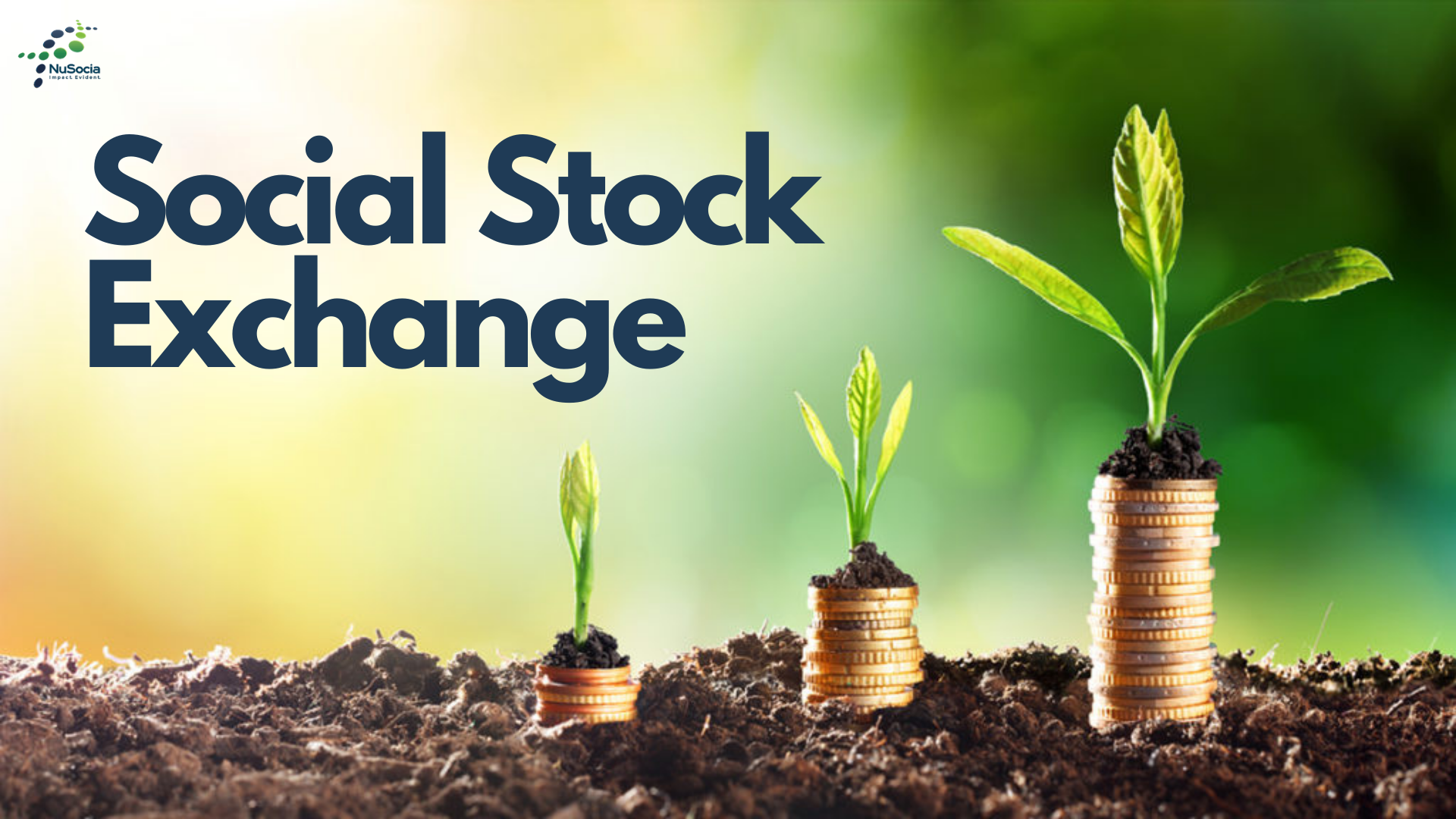A capital strategy to achieve social goals
In the last few weeks, the term Social Stock Exchange seems to be the hot news item. In this article, I have tried to uncover some basics around Social Stock Exchange and bring out why exactly is it in news.
Let’s start with understanding the very basic concept of stock exchange. The conventional stock exchange is a place where trading happens over financial investments and returns. It is a platform where buyers and sellers come together to trade financial tools during specific hours of any business day while adhering to a regulator’s well-defined guidelines. On Similar lines, Social Stock exchange is meant to be a trading platform where the returns are beyond the financials and are also measured in terms of social impacts.
Let us understand that the SSE is not a new institution being created but an electronic fundraising platform within the ambit of the existing stock exchange for the social enterprises and the Not-for Profit organisations. The purpose of the SSE is to unlock the pools of new capital for the social sector and to bring more visibility to the social impact created by the NPOs.
Global Social Stock Exchange Models
As an institution, Social Stock Exchange (SSE) has been practiced in some form or other in different parts of the world ranging from Singapore to South Africa to Canada. Let us briefly understand what is happening across the globe.
The Social Stock Exchange (SSX), UK : Focuses mainly on sustainable and socially responsible investors by connecting them to value-driven SMEs and entrepreneurs accredited for positive social and environmental impact. In 2018, it formed a partnership to trade with IIN (Impact Investing Network) and allows secondary trading on NEXGY, a regulated UK stock exchange for SMEs and entrepreneurships
The Social Venture Connexion (SVX), Canada : It has been successful in providing low cost access to investors for smaller social ventures raising over $100m+ and is targeted at socially responsible investors seeking positive impact alongside financial returns
Impact Investment Exchange (IIX), Singapore : This focuses on big ticket investors targeting HNIs, foundations, impact investment funds and institutional investors. It also allows non-profit organisations to raise capital via bonds with low interest rates payable. Companies listed here have to regularly publish social impact assessments. It has introduced interesting products like the women’s livelihood bonds in partnership with DBS bank to create world’s first sustainable bond raising $11m for microfinancing for women.
Some of the other prominent models across the globe are Socio-Environmental Investment Exchange (BVSA), Brazil; The Impact Exchange (IX), Mauritius; Jamaica Social Stock Exchange (JSSE); South Africa Social Investment Exchange (SASIX), Johannesburg – closed in 2017; Impact finance organization (IMFINO), Austria
Indian Social Stock Exchange
The seeds of the Indian SSE were sown in the union budget of FY 2019-20 when hon’ble Finance minister Nirmala Sitharaman announced, “I propose to initiate steps towards creating an electronic fund raising platform- a social stock exchange-under the regulatory ambit of Securities and Exchange Board of India for listing social enterprises and voluntary organizations working for the realization of a social welfare objective so that they can raise capital as equity, debt or as units like a mutual fund.” This was followed by SEBI forming a High Level Committee under the chairmanship of Ishaat Hussain, former Tata Sons Director and having a cross-sectoral representation of thought leaders in investment banking, SEBI, stock exchanges, NPOs(Not-for-Profits), impact investors, economic policy makers and academia. The working group commenced (September 2019) broader consultations with various stakeholders to develop a macro blueprint for the SSE. The terms of reference for this working group were to recommend possible structures and mechanisms to build an ecosystem could be built to facilitate fund-raising for the social impact organisations within the domain of the security market. The working group carried out broader consultations with various stakeholders and subject matter experts including with the following: a. Voluntary Organizations b. Social Enterprises c. Existing ecosystem players and d. Philanthropic Organisations (family owned/ institutions). By June 2020, the working group submitted its report with its recommendations to SEBI.
The working group recognised the need to balance on how stringent the listing norms should be – so as to be exciting to both NPOs/ FPEs as well as to the investors.
Some of the key recommendations were :
A. Reporting Standards to be met – While over time the requirements would get detailed and stringent, the working group has recommended minimum reporting requirement to begin with as below :
- Strategic Intent and Goal Setting
- What – is the social problem that you are solving
- Who – is the target segment being served
- How – do you plan to approach to solve the problem
- Social Impact Scorecard
- Reach – Extent of target segment served
- Depth – Intensity of impact on beneficiary
- Inclusion – along income, social equality and diversity
- Other Information
- Governance – Members of governing body
- Funding history
- Legal – Financials, Registrations, Licenses
Over time, the reporting requirements would increase and start including rigorous impact assessments including outcome level impact and sector level impact. While in short run, NPOs can self-report and FPEs can undergo a SEBI assessment, later social audit will become an important requirement.
B. Funding Models – For NPOs / NGOs, the SSE will enable the routing of grants and donations in a variety of ways. It would also enable the routing of risk capital to NPOs with instruments like zero coupon zero principal bonds or a Social Venture Fund or Development Impact Bonds (The investors are repaid with an additional return by outcome funders if providers achieve expected social outcomes, but lose their investment if providers fail to meet those outcomes) or Syndicate funding for larger NPOs. These instruments can be listed on SSE. There could also be socially intentioned MFs will operate as standard MF, with the exception that the returns generated are channelled towards the financing of NPOs, as donations. Eg. Cancer Fund of HDFC MF.
FPEs can list equity on SSE, with minimum reporting guidelines, to be prescribed by SEBI.
C. Regulatory requirements
Some of the key recommendations around regulatory norms is to allow funding to NPOs on SSE to count towards CSR commitments of companies with the condition that the board and management of the corporate providing CSR funds should not be related to the NPO to avoid conflict of interest.
D. CSR Trading
An interesting recommendation is to create opportunity for trading of CSR spends between companies with excess CSR-spends and those with deficit CSR-spends, on SSE.
E. Capacity Building
Allow expenditure by corporates on building capacity for the SSE to count towards their CSR commitments setting up a INR 100 crore “capacity building fund” to create a capacity building unit that will foster overall sector development.
Implications of SSE for key stakeholders
Moving forward, let’s try and understand the SSE in the context of few key stakeholders to understand from their perspective and how should they see it.
Government –This point of convergence for securities market and the social sector is a major step towards building the ecosystem to support the social finance and also an opportunity to rationalise multi-layer tax and regulatory framework for the NPOs (Trusts/Societies/Section 8 Companies). This also helps bridging the SDG performance gap (India accounts for more than 20% world performance gap in 10 out of 17 SDGs)
NPOs / NGOs –This provides an opportunity to raise funds through bonds, other instruments and structures available under the regulatory guidelines and potential to unlock CSR funding for capacity building. It also means the increasing need to improve skillset in governance, impact measurement and impact reporting. If retail investors are allowed on SSE, it can help NPOs generate much needed organisational development funds. Even if an NPO is not listed on SSE, it can gain from improved level of institutional mechanism such as Information repositories and social auditors.
For Profit Enterprises (FPEs) –This provides an opportunity to raise funds through structures such as equity and Social Venture Funds (SVFs). However there would be much wider scrutiny in form of SEBI assessment to get listed and clear statement of impact being created. If tax incentives can be provided to investors, it can act as a major boost to FPE social enterprise sector. The platform can act as collaboration platform to explore partnerships to address unmet needs of the market.
Corporate –If the recommendations go through, CSR trading and funding NPOs listed on SSE under CSR brings a new era of opportunities for corporate sector to meet its CSR compliance requirements. It also provides opportunity for corporate to strengthen their partner NPOs
Conclusion and way forward
The speed at which the working group has completed the draft report and presented it to all the stakeholders for their consultation, comments, suggestions and concerns entails that the SSE concept already gained a critical mass and its time that all the stakeholders of the social sector need to have greater understanding of this ecosystem.
It is important to note thatwhile SSE provides new avenues to the NPOs for raising funds and also incorporates a set of procedures by which social impact will be measured and reported, it does not prevent them from continuing their existing modes of fundraising and reporting impact. Inspired by the vision to take capital markets closer to the masses and meet various social welfare objectives related to inclusive growth and financial inclusion, the SSE has the potential to contribute towards closing the capabilities gap India is facing towards meeting the SDG goals.
Sanjiv Tare is part of the Leadership team at NuSocia and is based at Pune. He brings with him 35+ years of experience in CSR across corporate and advisory space. His last two roles before NuSocia was as CSR head at Tata Communications and thereafter a brief stint at Goodera.
We’d love to hear your thoughts on this hot topic. Do write to us: [email protected]




